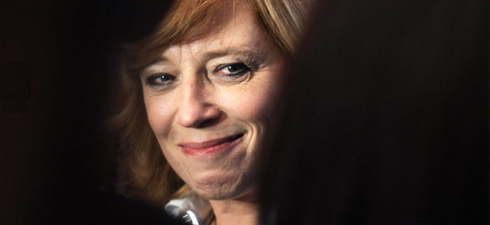In Slovakia, the rise of Iveta Radičová, age 53, has marked a sea change in politics to the point where the up-coming general election will be more than a simple struggle for political power, but a new stage in an ongoing battle between tradition and modernity, which began when she reached the second round of the 2009 presidential election race against Ivan Gašparovič — an archetypical Slovak male in love with cars, hockey and the traditional fujara flute. A former professor who was acclaimed as Slovakia's leading female sociologist, Iveta Radičová has launched a trend for a different style of politics. Presenting herself as a sensitive and cultivated woman, she refuses to accept the brutal rules that regulate the behaviour of her male colleagues, who turn the political arena into a war zone. Insisting that she would "prefer to give up politics if it means setting aside the principle of politeness," in television debates, she systematically greets all of her political adversaries with a broad smile.
This "feminine approach" is accompanied by publicly avowed advocacy of modern European liberal values on religious belief ("a matter for private individuals"), the issue of abortion ("women should be trusted to make the decision") and a concern for the rights of minorities of all kinds: Hungarians, Roms, migrants and gays. Although it is certainly more than the expression of political opportunism, Radičová has used her role as the champion of an open-minded attitude to gain wide coverage in the media, and in particular the support and respect of the tabloids, which she cultivates with regular interviews that feature comments on such issues as her status as a blonde ("I have an excellent hairdresser"), her taste for confectionary ("I know as much about sweets and chocolate as I do about legislation"), and her private life.
Pressed a voting button for absent colleague
Having built a reputation in intellectual circles where she was recognized for her exceptional intelligence and impeccable political credentials — notably as one of a group 14 sociologists who publicly protested against the arrest of Slovak dissidents in 1989 — Radičová first emerged in public life when she was appointed to the post of Labour Minister in 2005. After years of neo-liberal rhetoric espoused by the government of Mikuláš Dzurinda (the former leader of the SDKÚ who was prime minister from 1998 to July 2006) Radičová, who was the only woman to occupy a senior post in the government, introduced a new political language: instead of levelling accusations about the abuse of social services, she opted to speak about the poor who found themselves in desperate circumstances through no fault of their own, and the state's duty to provide them with assistance.
In the wake of her defeat in the 2009 presidential election, Radičová committed an error when she pressed a voting button for a colleague who was not present in parliament. The subsequent allegations of fraud sparked an outcry and resulted in a political and media witch hunt, which culminated in Radičová's resignation from her parliamentary mandate. At the time, the daily SME announced that she was a defunct force in politics, and it appeared that her career was well and truly over. But everything changed at the end of January. Radičová announced that she would be a candidate in the contest for the leadership of her party, to take place in the run-up to general elections scheduled for 12 June. She won the primary vote, defeating Mikoláš Dzurinda, and now the polls, which have predicted a victory for the right, indicate that she has a strong chance of becoming Slovakia's next prime minister. Radičová claims that her main role model is Angela Merkel. but in the corridors of the SDKÚ, the fear is that she may prove to have far more in common with Ségolène Royal, who lost the French presidential vote to Nicolas Sarkozy in 2007.
Was this article useful? If so we are delighted!
It is freely available because we believe that the right to free and independent information is essential for democracy. But this right is not guaranteed forever, and independence comes at a cost. We need your support in order to continue publishing independent, multilingual news for all Europeans.
Discover our subscription offers and their exclusive benefits and become a member of our community now!












